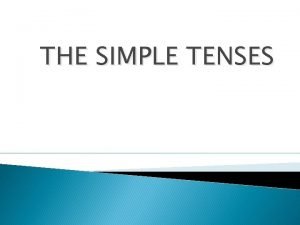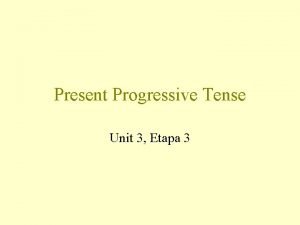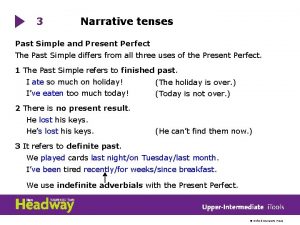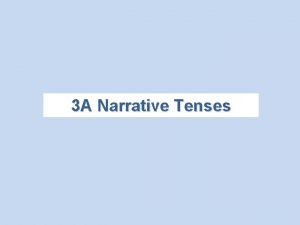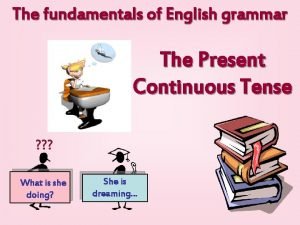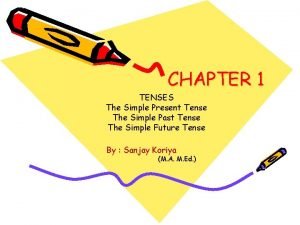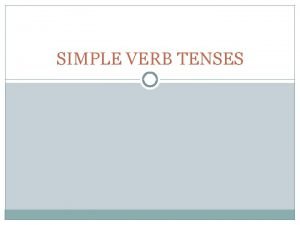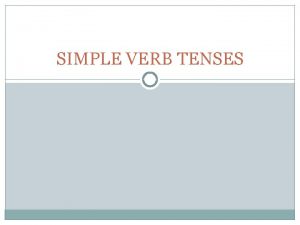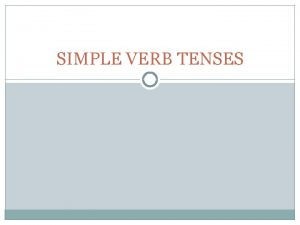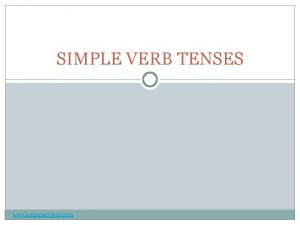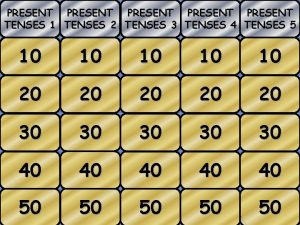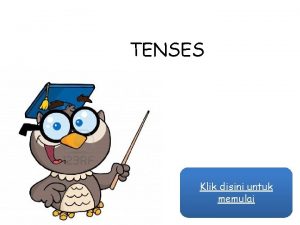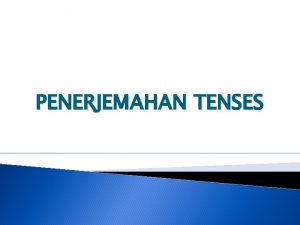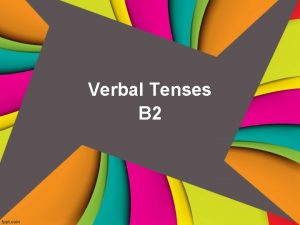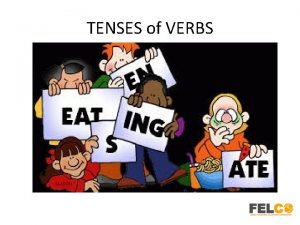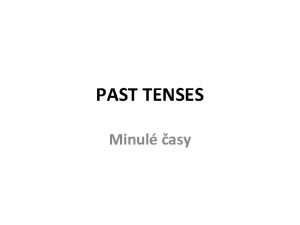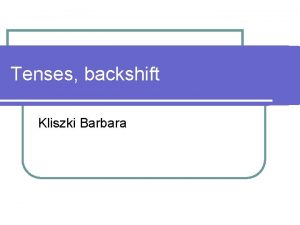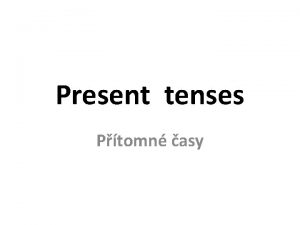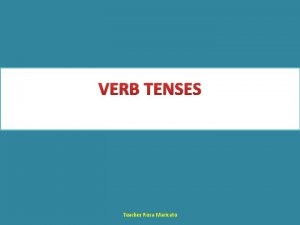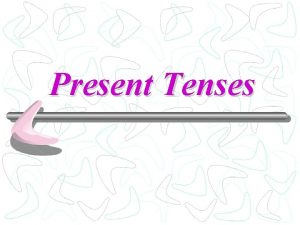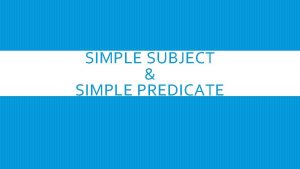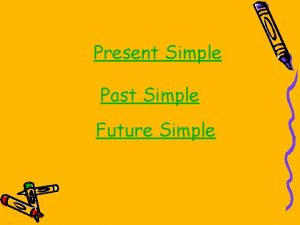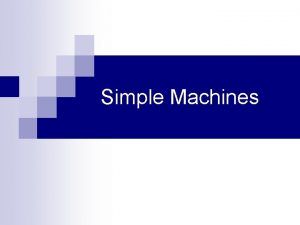THE SIMPLE TENSES The are three simple tenses










































- Slides: 42

THE SIMPLE TENSES

The are three simple tenses 1. Simple present tense 2. Simple past tense 3. Simple future tense

1. Simple present tense Definition we use the simple present tense for things that are true in general, or for things that happen some times or all the time. Structure of simple present Positive. subject + main verb + object I/we/you/they study English He/she/it studies English

Negative subject + don’t/doesn’t + main verb I/we/you/they don’t He/she/ it doesn’t Examples I don’t like washing the car. She doesn’t speak English.

Question Do/does + Subject + base form Do I/we/you/they work? Does he/she/it work?

Always/never/often/sometimes /usually+ present simple. Sara always arrives at work early. I usually go to work by car but sometimes I walk( not I go usually) Julia never eats breakfast.

2. THE SIMPLE PAST TENSE Definition the simple past tense describes actions or situation that began and ended in the past

Structure positive Subject +past tense verb +object + time expression I/we/you/they/he/she/it came/watched/began etc Example I came to Canada three months ago verb time expression

Negative and quetion we use did in past simple negative and question. I/we/you/they/he/she didn’t play, start, watch, etc. Did I/we/you/they/he/she/it play?

3. THE SIMPLE FUTURE TENSE Definition this tense is used for an action or situation that will happen in the future. - we use shall/will for the future. -Be going to is also use in conversational English. -Both will and be going to are followed by the simple form of a verb

The structure of simple future postive Subject + shall/will + infinitive I will buy you a new jacket soon we shall go the ceremony. He will phone you tomorrow.

Negative subject + shall not/will not + infinitve I won’t come to the party. You won’t sleep well if you drink too much coffee. She won’t be here tommorrow.

Question will/shall +Subject + infinitive will I win? Shall I phone you this evening? Shall we go for a walk? Will you help me?

Be going to is used for action planned for the future. Examples Kamal is going to take his placement test tomorrow. We’re going to meet him after the test

PART 3 THE CONTINUOUS TENSES

The continuous tenses generally describes actions that are in progress during another time or event. -The time or event must be given or ( especially in the case of the present continuous ) implied. -Verbs that show no action (be, want, like, seem, and so on) are not used in the continuous tenses.

1. The present continuous tense Definition The present continuous tense is often used for activities or situations that happening now. Structure of present continuous tense positive subject + am/is/are + main verb + ing I am driving to work now He/she/it is driving to work now we/you/they are driving to work now

Negative Subject +am/is/are+ not + main verb + ing. I am not driving to work now He/she/it is not driving to work now. we/you/they are not driving to work now.

Question Am/is/are + subject + main verb + ing Am I driving to work now? Is he driving to work now? Is she driving to work now? Are we driving to work now?

2 The past continuous tense Definition : The past continuous tense describes actions in progress in the past. Structure of past continuous tense positive subject + was/were + main verb + ing I was looking at the traffic signal but not the traffic. He was cleaning at 10: 00. He was sleeping when the phone rang. We were studying while he was sleeping.

Negative Subject +was/were+ not + main verb + ing. I was not looking at the traffic signal. He was not sleeping when the phone rang. We were not studying while he was not sleeping.

Question was/were + subject + main verb + ing Was he sleeping at 10: 00? Were you studying while he was sleeping? Were the students reading when the teacher went out?

3 The future continuous tense. Definition : The future continuous tense refers to actions that will be in progress in the future. Structure of the future continuous. positive Subject + will/shall + be main verb + ing He will be flying to London next Monday. He will be resting then. We shall be cooking dinner tonight.

Negative Subject +will/shall+ not +be + main verb + ing. Examples He will not be flying next Monday. He will not be resting then. We shall not be cooking dinner tonight.

Question will/Shall + subject + be + main verb + ing Will he be flying to London next Monday? Will he be resting then? Shall we be cooking dinner tonight?

Part 4 The perfect and perfect continuous Tenses A. The perfect Tenses The perfect tenses generally refer to events that are completed before another time. There are three perfect tenses and they are: 1. Present perfect eg. Daud has finished the assignment. 2. Past perfect eg He had finished by 6: 00 yesterday 3. Future perfect. Eg. He will have finished by 6: 00 tomorrow


Definition: We use the present perfect tense to talk about things that happened at some time in the past and have a connection to the present. He has lived in Sha Tin for twenty years. She has taken art lessons for two months. I have drunk five glasses of water since lunch.

The present perfect form of a verb is made up of two parts. Positive statements are formed like this. Subject have/has Past participle I You We They have finished. He/She/It has eaten.

Negative statements are formed like this. not I have finished.

Negative statements are formed like this. I have not/haven’t finished. not You have finished.

Negative statements are formed like this. I have not/haven’t finished. You have not/haven’t finished. She has not/hasn’t finished.

Questions are formed like this. I have finished. Have I finished? You have finished. Have you finished? She has finished. Has she finished?

We often use the following words with the present perfect tense. already ever for just since Which word is followed by a certain time in the past? We have been to the airport five times since July. I haven’t seen Helen since last summer. yet since

We often use the following words with the present perfect tense. already ever for just since yet Which word is followed by a length of time? I have been a member of the Drama Club for three years. She hasn’t written to me for a year. for

We often use the following words with the present perfect tense. already ever for just since yet Which word is often used with negative statements and questions when the action has happened already or we expect it to happen soon? Have you done your Maths homework yet? yet Has your brother taken his driving test yet? My parents haven’t signed my report card yet. I haven’t had lunch yet. Yet usually goes at the end of the question or negative statement.

We often use the following words with the present perfect tense. already ever for just since Which other word is often used with the present perfect tense in questions? Have you ever travelled on a motorbike? Has he ever invited you out for lunch? We put ever between the subject and the main verb. yet ever

Complete the following sentences with the correct form of the simple past tense or present perfect tense of the verbs in brackets. Write in a subject if necessary. 1 Have you seen(you / see) my school bag? (I / leave) it on my desk a minute ago and it’s gone now. 2. A fire (break out) in our building last night. All the residents (have) to leave their homes and wait in the street. Luckily, no one (be) injured. 3 just (I / come) back from my holiday. go) to Hawaii with my friends. 4 My dad (be) a chef for twenty years. be) a teacher before (he / become) a chef. 5 ever (you / try) duck’s tongues? (I / have) any and I don’t want to try. (I / (he / never

C. The present perfect continuous Tenses the perfect continuous tenses refer to actions that begin before and continue up to another time or event. There are three perfect continuous tenses 1. present perfect continuous tense 2. past perfect continuous tense 3. Future perfect contin

1. Present perfect continuous tense Definition: The present perfect continuous tense can describe actions or situations that began in the past and continue to the moment of speaking. Structure positive Subject + has/have + been + main verb + ing I have been studying English for five years. He has been studying English since 7 th grade.

Negative Subject + has/have +not been + main verb + ing I have not been studying English for five years. He has not been studying English since 7 th grade

Question Sructure Have/has + subject + been + main verb + ing Examples Have you been studying English for five years? How long has Mohamed been studying English? Has he been studying English since the 7 th grade?
 Antigentest åre
Antigentest åre Future continuous tense
Future continuous tense Three tenses of salvation chart
Three tenses of salvation chart Uselaschicas
Uselaschicas Narrative verb tenses
Narrative verb tenses Narrative tenses past simple past continuous
Narrative tenses past simple past continuous What simple tenses are the fundamentals of english grammar
What simple tenses are the fundamentals of english grammar Simple past vs past continuous vs past perfect
Simple past vs past continuous vs past perfect 1. the simple present tense
1. the simple present tense T
T Hình ảnh bộ gõ cơ thể búng tay
Hình ảnh bộ gõ cơ thể búng tay Frameset trong html5
Frameset trong html5 Bổ thể
Bổ thể Tỉ lệ cơ thể trẻ em
Tỉ lệ cơ thể trẻ em Gấu đi như thế nào
Gấu đi như thế nào Glasgow thang điểm
Glasgow thang điểm Alleluia hat len nguoi oi
Alleluia hat len nguoi oi Các môn thể thao bắt đầu bằng tiếng đua
Các môn thể thao bắt đầu bằng tiếng đua Thế nào là hệ số cao nhất
Thế nào là hệ số cao nhất Các châu lục và đại dương trên thế giới
Các châu lục và đại dương trên thế giới Công thức tính độ biến thiên đông lượng
Công thức tính độ biến thiên đông lượng Trời xanh đây là của chúng ta thể thơ
Trời xanh đây là của chúng ta thể thơ Cách giải mật thư tọa độ
Cách giải mật thư tọa độ Làm thế nào để 102-1=99
Làm thế nào để 102-1=99 độ dài liên kết
độ dài liên kết Các châu lục và đại dương trên thế giới
Các châu lục và đại dương trên thế giới Thể thơ truyền thống
Thể thơ truyền thống Quá trình desamine hóa có thể tạo ra
Quá trình desamine hóa có thể tạo ra Một số thể thơ truyền thống
Một số thể thơ truyền thống Bàn tay mà dây bẩn
Bàn tay mà dây bẩn Vẽ hình chiếu vuông góc của vật thể sau
Vẽ hình chiếu vuông góc của vật thể sau Biện pháp chống mỏi cơ
Biện pháp chống mỏi cơ đặc điểm cơ thể của người tối cổ
đặc điểm cơ thể của người tối cổ Thế nào là giọng cùng tên?
Thế nào là giọng cùng tên? Vẽ hình chiếu đứng bằng cạnh của vật thể
Vẽ hình chiếu đứng bằng cạnh của vật thể Vẽ hình chiếu vuông góc của vật thể sau
Vẽ hình chiếu vuông góc của vật thể sau Thẻ vin
Thẻ vin đại từ thay thế
đại từ thay thế điện thế nghỉ
điện thế nghỉ Tư thế ngồi viết
Tư thế ngồi viết Diễn thế sinh thái là
Diễn thế sinh thái là Dạng đột biến một nhiễm là
Dạng đột biến một nhiễm là Số.nguyên tố
Số.nguyên tố

